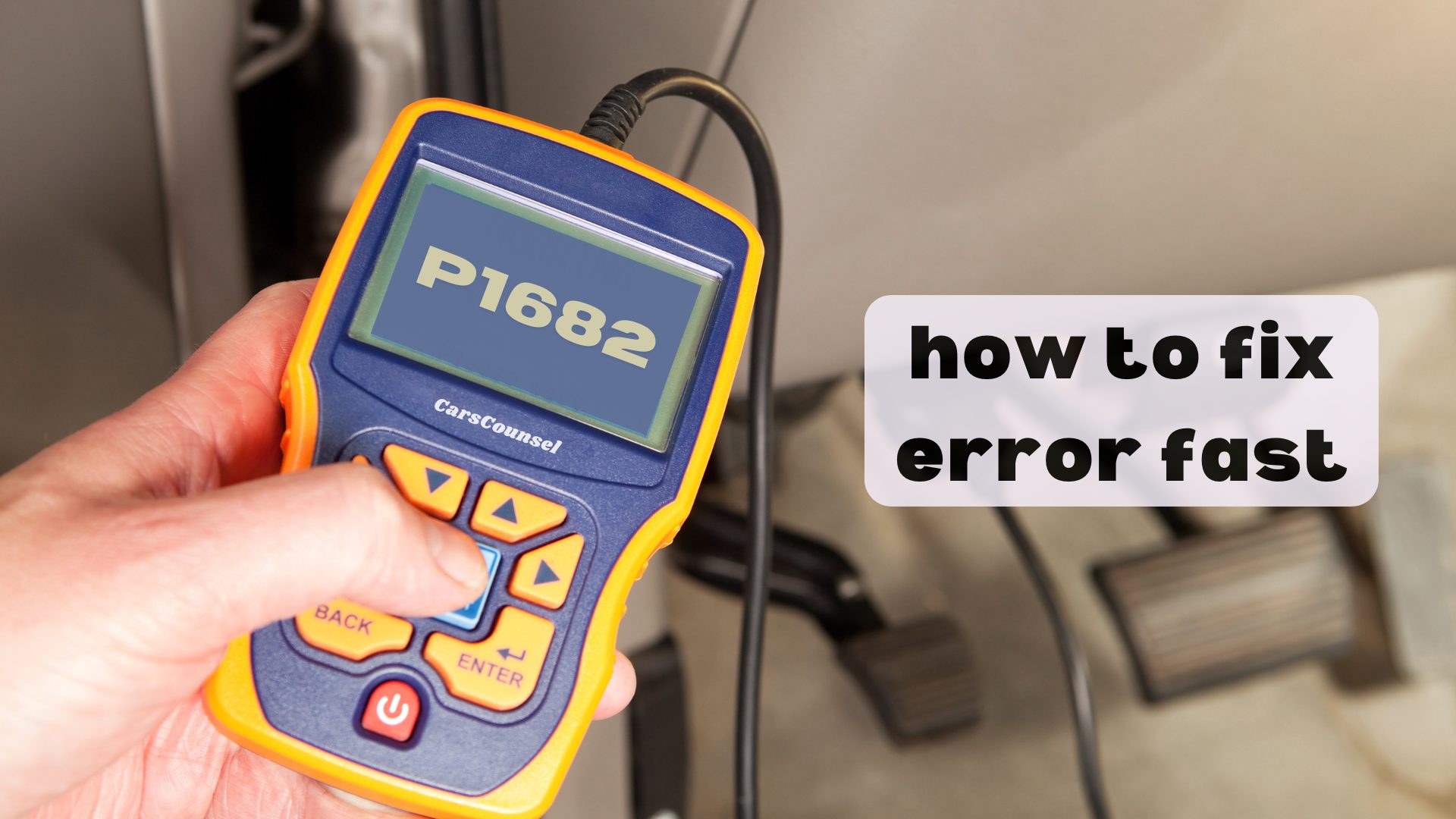If you’ve come across the P1682 code, you know it can be a real pain. This code usually indicates a problem with your ignition switch or wiring, which can make your engine act up.
First, take a look for any obvious damage or corrosion around these parts.
But how do you quickly figure out if the OBD2 Codes issue is with the ignition switch, wiring, or even the battery?
Let’s walk through the steps to diagnose and fix this OBD2 Codes error so you can get your vehicle running smoothly again without wasting any time.

Quick Navigation
Key Takeaways
- Look at and clean the battery terminals to make sure they are connected well and have the right voltage.
- Check all the wiring for any signs of damage or looseness and secure them properly.
- Visually inspect the ignition switch and use a multimeter to test for voltage and continuity.
- Replace the ignition switch if you see that the contacts are worn out or corroded to get it working right again.
Understanding the P1682 Code
Understanding the P1682 code is important because it usually points to problems in the ignition switch circuit. These problems can cause your car to stall or not start at all. This code can mess with your car’s starting system, affecting how it runs and uses fuel.
To troubleshoot, start by checking for any loose or damaged wires, as these can set off the P1682 code. Then, look at the ignition switch to see if the contacts are worn out or corroded. Use a multimeter to check if the voltage and continuity are correct.
These steps will help you find and fix the issue. Remember, the P1682 code is a common problem that can happen in many different car brands, so accurate diagnosis is key to a quick fix.
Symptoms of P1682 Code
When your vehicle shows a P1682 code, you’ll usually notice problems like having a hard time starting the engine, the engine stalling on and off, and warning lights on the dashboard. Recognizing these symptoms is key to figuring out what’s wrong. Use the right tools to quickly find the problem.
| Symptom | Diagnostic Tool |
|---|---|
| Hard time starting | OBD-II scanner |
| Engine stalling on and off | Multimeter |
| Dashboard warning lights | Code reader |
| Electrical problems | Voltage tester |
These issues might point to problems with the ignition switch circuit. Finding and fixing the problem quickly with the right tools can avoid more serious issues. Make sure to check for related problems to make the troubleshooting process easier and improve your vehicle’s reliability and performance.
Common Causes of P1682
Several things can cause a P1682 code, with a bad ignition switch being the most common problem. To fix ignition issues, focus on these common causes:
- Loose or damaged wiring: Check for frayed wires that can cause low voltage.
- Dead battery: Make sure the battery has enough power, as a weak battery can trigger the P1682 code.
- Environmental factors: Heat can damage wiring, so regular electrical maintenance is important.
By looking into these areas, you can find the source of the issue.
Inspecting the ignition switch and related parts is crucial. Regular electrical maintenance can help prevent these problems and keep your vehicle’s starting system working well.
Faulty Ignition Switch
A faulty ignition switch usually happens because the contacts inside get worn out or rusty. This can mess up the ignition circuit, causing problems when starting the car or making the engine stall.
Here’s how to fix it:
- Check the ignition switch for any visible damage or rust.
- Use a multimeter to test for proper voltage and continuity.
- If the switch isn’t working right, you’ll need to replace it.
- Make sure all connections are tight and clean.
- Install the new switch correctly and test the system again.
Following these steps will help get your vehicle running smoothly again and fix the P1682 code.
Wiring and Battery Issues
Check the vehicle’s wiring for any signs of wear or damage, as loose or corroded connections can cause low voltage and trigger the P1682 code.
Pay extra attention to the wiring harness to make sure all connections are tight and free from rust. Also, take care of the battery by checking that the battery terminals are clean and securely attached.
Here’s a simple checklist to follow:
- Look at the Wiring Harness: Check for any frayed or damaged wires that could cause voltage drops.
- Check Battery Terminals: Make sure they’re clean and tightly connected to keep the voltage steady.
- Test Battery Voltage: Use a multimeter to ensure the battery is giving the right voltage.
Keeping your vehicle’s electrical system in good shape can help prevent the P1682 code from coming back.
Environmental Factors
Exposure to extreme temperatures can damage wiring insulation and cause the P1682 code. The weather can greatly affect your vehicle’s electrical system, especially in areas with severe conditions. High heat speeds up insulation wear and tear, leading to shorts and low voltage problems. Cold weather can make wires brittle and more likely to crack.
To address these issues, take steps to prevent corrosion. Regularly check the wiring for any signs of damage or rust. Use dielectric grease on connectors to keep out moisture. Choose heat-resistant and weatherproof materials for any wiring repairs.
Affected Car Models
Affected Car Models
The Chevy Malibu, Chevy Cobalt, and Pontiac G6 often show the P1682 code, usually due to ignition switch problems. These cars have had major recalls in the past because of these issues. If you own one of these vehicles, here’s what you should know:
- Chevy Malibu: Known for ignition switch problems, with a big recall in 2014.
- Chevy Cobalt: Involved in serious accidents, leading to a large recall in 2014.
- Pontiac G6: Often shows the P1682 code because of bad ignition switches.
Knowing the recall history of these cars can help you spot problems early and fix them quickly.
Always keep up with manufacturer recalls and service bulletins to ensure your car stays reliable.
Visual Inspection Tips
Take a good look at the ignition switch and the wiring around it to spot any obvious damage or wear. Use an inspection tool kit to help you go through your checklist. Look for frayed wires, rusty connections, and loose terminals. Make sure all wire harnesses are tightly fastened and not damaged by heat or moisture.
| Component | What to Look For |
|---|---|
| Ignition Switch | Wear, rust, and damage |
| Wiring Harness | Frayed wires, loose connections |
| Connectors and Terminals | No rust, tight fit |
A careful visual inspection can help you find problems that might cause the P1682 code, making it easier and faster to diagnose issues without unnecessary tests.
Testing Ignition Components
How do you make sure your ignition parts are working right? Start by thoroughly testing and checking each component. Here’s how:
- Check with a Multimeter: Use a multimeter to see if the ignition switch has the right voltage and continuity. Make sure the readings match what the manufacturer says they should be.
- Look at the Wiring: Check all the wires connected to the ignition. Look for any wear, rust, or damage. Replace any bad wires to avoid low voltage problems.
- Test the Battery: Use a voltmeter to check the battery’s voltage. A fully charged battery should show about 12.6 volts. If it’s lower, there might be an issue.
When to Seek Help
If you’ve tried fixing the P1682 code but the problem is still there, it’s time to call a professional. Ongoing issues mean that basic troubleshooting mightn’t be enough.
Pros have advanced tools and know-how to find the exact cause of the ignition switch problem, whether it’s bad wiring, a rusty ignition switch, or a more serious electrical issue. They can use precise methods that go beyond simple checks, ensuring a complete fix.
Don’t risk making things worse by continuing without proper knowledge. Experts can also check if other related codes are part of the problem, giving you a thorough solution.
Save time and stay safe by getting professional help when your DIY efforts don’t work.
More OBD-II Codes
Frequently Asked Questions
Can Aftermarket Parts Affect the Occurrence of the P1682 Code?
Yes, aftermarket parts can cause the P1682 code to show up. Make sure the parts are compatible and of good quality. Cheap or incorrect parts can lead to electrical problems, which might mess with the ignition switch circuit and trigger the error code.
How Do Weather Conditions Influence the P1682 Code?
Weather has a big impact. Changes in temperature can make wire insulation crack, which can cause electrical problems. High heat can damage parts, while cold weather can affect the battery, both of which can trigger the P1682 code.
What Are the Costs Associated With Fixing the P1682 Code?
You’ll spend about $100 to $150 on diagnostic tools and $200 to $400 on repairs, depending on how bad the problem is. Professional labor can add another $100 to $200. Costs can vary a lot depending on your vehicle model and the specific issue.
Are There Any Temporary Fixes for the P1682 Code?
To temporarily fix the P1682 code, you can check and secure any loose wires, clean the battery terminals, and use a diagnostic tool to clear the code. However, these are just short-term solutions. For a lasting fix, it’s best to get professional repair.
How Long Does It Take to Diagnose and Repair the P1682 Code?
Figuring out what’s wrong with the P1682 code can take 1-2 hours. Fixing it usually takes another hour, depending on whether you need to change the ignition switch or fix the wiring.
Conclusion
Imagine driving down the highway without that annoying P1682 code.
You’ve carefully checked the ignition switch, tested the connections with a multimeter, and made sure your battery is in great condition. The engine runs smoothly, showing that you’ve fixed the problem.
If the issue persists, don’t wait—get a professional to do advanced diagnostics.
Remember, a quick and thorough approach will keep your car reliable and trouble-free, so you can enjoy the open road with confidence.

